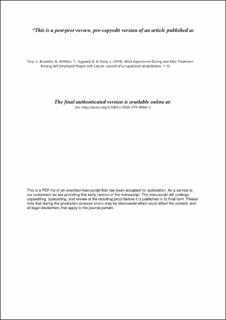| dc.description.abstract | Purpose The proportion of self-employed people in the workforce is growing. However, most research on work participation among cancer survivors has focused on salaried workers. We aimed to explore how self-employed people experience work during and after cancer treatment. Methods In this qualitative study, we conducted semi-structured interviews with seven self-employed people who had been treated for cancer. To provide a variety of perspectives on work-related aspects of self-employed cancer survivors we also interviewed seven counselors in the Norwegian Labour and Welfare Administration (NAV) who had long experience in supporting self-employed people and cancer patients around work participation. The interviews were transcribed verbatim and thematic analysis was undertaken. Results Five themes related to owning a business during and after cancer treatment emerged: entrepreneurship and engagement; cancer treatment and late-effects; business-related worries; shame; and support. Because of high job engagement and high autonomy the self-employed survivors often worked during treatment. While working could provide a sense of normalcy and a distraction from cancer, it was also essential to keep the business running. Survivors struggled with several work-related issues (e.g. high work demands, low work ability), but financial issues related to running their business caused particular worry. Getting cancer and, consequently, struggling with financial problems elicited a sense of shame that was closely connected to their strong identity as (successful) self-employed business (wo)men. Conclusion To support self-employed cancer survivors to retain work following a cancer diagnosis it is necessary to focus on the specific challenges faced by this group of workers, particularly related to financial issues and keep-ing the business afloat. Support measures to secure production and thus prevent loss of customers and bankruptcy are needed. It is important for health and social care personnel to be aware that self-employed cancer survivors may suffer from shame related to the cancer, low work ability and financial struggles, but that they may have difficulties talking about this shame. | en_US |
